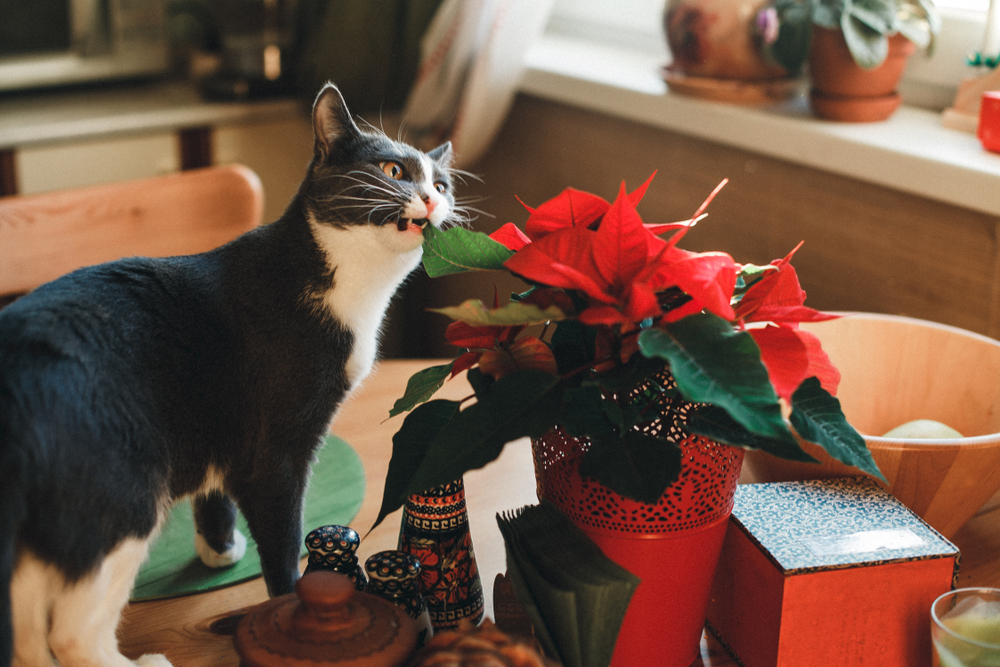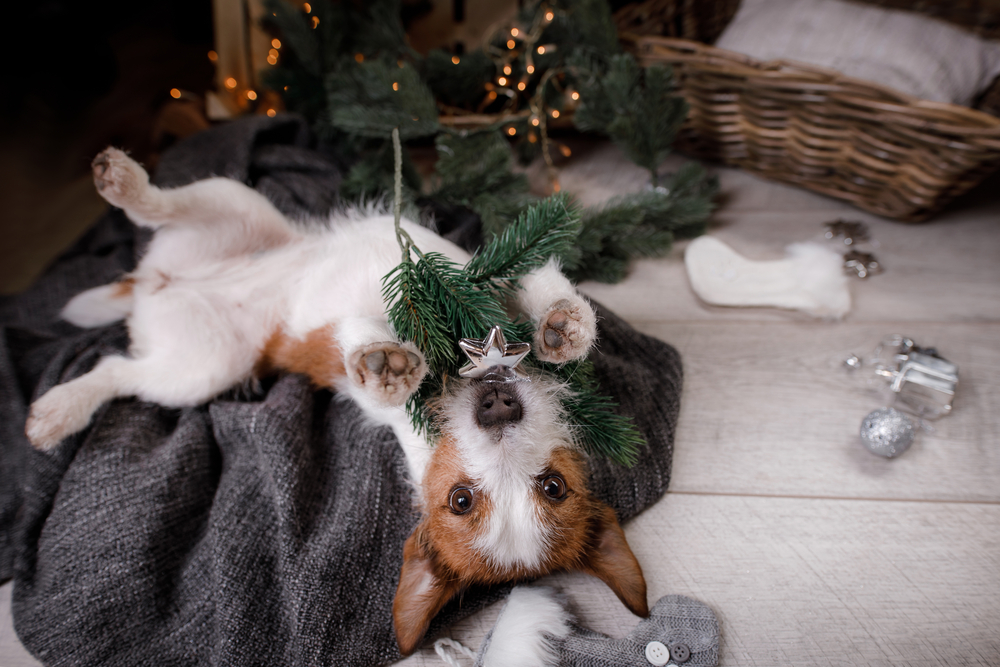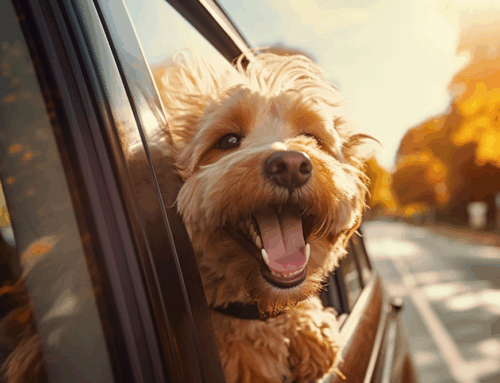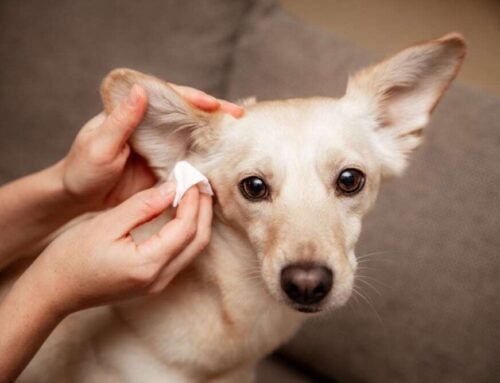’Tis the season to be jolly, but as temperatures drop and Santa prepares for his nighttime trip, you should take steps to protect your pet from potential holiday hazards. Our Animal Medical Hospital of Naples team wants to help by explaining what dangers your pet may face during the holiday season.
#1: Holiday food can be hazardous for pets
Several common holiday foods are dangerous for pets—especially high-fat foods because they can trigger a dangerous, potentially life-threatening condition called pancreatitis. Other foods that are hazardous for pets include:
- Turkey bones — Turkey bones are fragile, and they can easily break, injuring your pet’s mouth or gastrointestinal (GI) tract.
- Allium vegetables — Vegetables like onions, garlic, leeks, chives, and shallots contain N-propyl disulfide, which can cause oxidative damage to your pet’s red blood cells and result in anemia.
- Chocolate — All types of chocolate, but especially dark chocolate, are toxic to pets. The chocolate contains caffeine and theobromine, which cause central nervous system stimulation in pets.
- Grapes — Grapes and raisins contain a toxin, potentially tartaric acid, that causes kidney failure in pets.
- Macadamia nuts — Macadamia nuts contain an unknown toxin that causes weakness, vomiting, lack of coordination, and hyperthermia.
- Raw dough — If ingested, raw yeast dough can expand, causing your pet to become bloated and potentially causing gastric dilatation volvulus (GDV). In addition, as fermentation occurs, alcohol is produced that can enter your pet’s bloodstream and cause alcohol poisoning.
#2: Holiday decorations can be hazardous to pets
Decking your halls with beautiful decorations may make your home feel festive, but these adornments can pose a danger to your pet. Potential problems include:
- Christmas trees — Cats love to climb Christmas trees, but this can cause the tree to topple, and result in panic and injury. Secure your Christmas tree using a sturdy tree stand and anchor the tree to the ceiling or to an adjacent wall to help prevent an accident.
- Ornaments — Fragile ornaments can break, causing injury to your pet’s mouth or paws. Avoid hanging breakable ornaments or ensure they are placed higher on the tree where your pet can’t reach them.
- Light cords — Some pets can’t resist chewing on electrical cords. Use cord covers to help prevent your pet from being shocked.
- Tinsel — Cats are especially drawn to sparkly tinsel, but if they ingest the substance, the linear foreign body can result in GI obstruction or perforation.
#3: Holiday parties can be hazardous to pets
The holidays are a perfect way to spend time with your friends and family, but these gatherings can be dangerous for pets. Steps to help keep your pet safe at your next holiday party include:
- Identifying your pet — Ensure your pet is properly identified so they can be returned to you if they go missing. Microchipping is the best way to provide permanent identification for your four-legged friend, and they also should wear a collar and identification tags that have your current contact information.
- Keeping your pet inside — The mayhem caused by a large gathering can frighten some pets, causing them to run away. Ensure your guests know your pet isn’t allowed outside, and monitor doors when people go in and out.
- Creating a pet safe zone — Designate a room in your home where your pet can go if they become overwhelmed or stressed by the gathering. Consider confining your pet to this area if they tend to get anxious around strangers.
- Considering anxiety relief — If your pet is prone to anxiety issues, consider asking your veterinary team if anxiety medications or supplements can help them cope with the holidays.
#4: Holiday guest belongings can be hazardous for pets
Ensure your guests’ belongings are placed in a secure area so your pet can’t get to any dangerous items they contain. Potential dangers include:
- Xylitol — Xylitol is a sugar substitute found in many sugar-free gums and mints. This substance is toxic to pets, causing a dose-dependent insulin release that can result in severe hypoglycemia. Liver damage also can occur.
- Ibuprofen — Ibuprofen is a non-steroidal anti-inflammatory (NSAID) that has analgesic, anti-inflammatory, and fever-controlling properties. This medication can cause GI ulceration and kidney failure in pets.
- Acetaminophen — Acetaminophen is a common human medication used to control pain. The medication can cause liver damage in pets, and cats are especially sensitive to the drug.
#5: Holiday plants can be hazardous for pets

Many seasonal plants commonly used to decorate during the holidays are poisonous to pets, including:
- Poinsettias — The milky white sap found in poinsettias contains chemicals called diterpenoid that cause signs such as vomiting, drooling, and diarrhea.
- Holly — Holly contains toxins, including saponins, methylxanthines, and cyanogens, that cause severe GI upset in pets.
- Mistletoe — Berries from this holiday plant contain polysaccharides, alkaloids, and lectins that can cause GI signs, including drooling, vomiting, diarrhea, and abdominal pain. If ingested in a large amount, signs may include lack of coordination, collapse, and seizures.
Knowing what hazards your pet may face this holiday season can help you take steps to safeguard your four-legged friend. If your pet is prone to anxiety issues, contact our team at Animal Medical Hospital of Naples so we can determine if an anti-anxiety medication or supplement can help them through the holiday season.






Leave A Comment